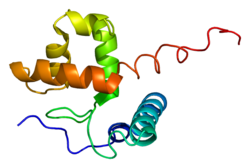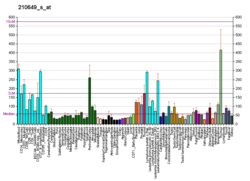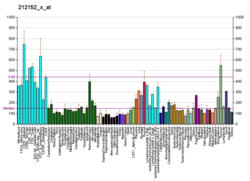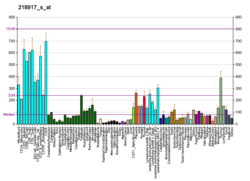ARID1A - ویکیپدیا، دانشنامهٔ آزاد
پروتئین اِی۱ حاوی دومِـین تعاملی غنی از آدنین-تیمین (انگلیسی: AT-rich interactive domain-containing protein 1A) یک پروتئین است که در انسان توسط ژن «ARID1A» کُدگذاری میشود.[۴][۵][۶]
اهمیت بالینی
[ویرایش]این پروتئین متعلق به خانوادهٔ SWI/SNF است که همگی خواص هلیکاز و ایتیپاز دارند و در تنظیم رونویسی برخی ژنها از طریق ایجاد تغییر در ساختارهای کروماتین آنها نقش دارد. جهش در کُدگذاری ژن این پروتئین، شایعترین عضو خانوادهٔ SWI/SNF جهشیافته در میان سرطانها است.[۷] این ژن معمولاً در سرطانهای مختلف جهشیافته است که یک «جهش کارکردزُدا» است، از جمله در سرطان معده،[۸] سرطان روده بزرگ،[۹] کارسینوم سلول شفاف تخمدان،[۱۰] سرطان کبد،[۱۱] لنفوم[۱۲] و سرطان لوزالمعده.[۱۳] در متاستازهای دوردست سرطان پستان، جهشهای غیرفعالکنندهای در ژن «ARID1A» تجمیع میشود که در تومور اولیه دیده نمیشوند، و کاهش بیان ژن «ARID1A» باعث مقاومت در برابر داروهای مختلف مانند تراستوزومب و مهارکنندههای mTOR میشود. این یافتهها دلیلی برای توضیح این موضوع است که چرا تومورها جهشهای ژن ARID1A را تجمیع و حفظ میکنند.[۱۴][۱۵]
منابع
[ویرایش]- ↑ ۱٫۰ ۱٫۱ ۱٫۲ GRCm38: Ensembl release 89: ENSMUSG00000007880 - Ensembl, May 2017
- ↑ "Human PubMed Reference:". National Center for Biotechnology Information, U.S. National Library of Medicine.
- ↑ "Mouse PubMed Reference:". National Center for Biotechnology Information, U.S. National Library of Medicine.
- ↑ Takeuchi T, Furihata M, Heng HH, Sonobe H, Ohtsuki Y (June 1998). "Chromosomal mapping and expression of the human B120 gene". Gene. 213 (1–2): 189–193. doi:10.1016/S0378-1119(98)00194-2. PMID 9630625.
- ↑ Takeuchi T, Chen BK, Qiu Y, Sonobe H, Ohtsuki Y (December 1997). "Molecular cloning and expression of a novel human cDNA containing CAG repeats". Gene. 204 (1–2): 71–77. doi:10.1016/S0378-1119(97)00525-8. PMID 9434167.
- ↑ "Entrez Gene: ARID1A AT rich interactive domain 1A (SWI-like)".
- ↑ Gourisankar S, Krokhotin A, Wenderski W, Crabtree GR (November 2023). "Context-specific functions of chromatin remodellers in development and disease". Nature Reviews. Genetics: 1–22. doi:10.1038/s41576-023-00666-x. PMID 38001317.
- ↑ Wang K, Kan J, Yuen ST, Shi ST, Chu KM, Law S, Chan TL, Kan Z, Chan AS, Tsui WY, Lee SP, Ho SL, Chan AK, Cheng GH, Roberts PC, Rejto PA, Gibson NW, Pocalyko DJ, Mao M, Xu J, Leung SY (October 2011). "Exome sequencing identifies frequent mutation of ARID1A in molecular subtypes of gastric cancer". Nature Genetics. 43 (12): 1219–1223. doi:10.1038/ng.982. PMID 22037554. S2CID 8884065.
- ↑ Mathur R, Alver BH, San Roman AK, Wilson BG, Wang X, Agoston AT, Park PJ, Shivdasani RA, Roberts CW (February 2017). "ARID1A loss impairs enhancer-mediated gene regulation and drives colon cancer in mice". Nature Genetics. 49 (2): 296–302. doi:10.1038/ng.3744. PMC 5285448. PMID 27941798.
- ↑ Wiegand KC, Shah SP, Al-Agha OM, Zhao Y, Tse K, Zeng T, Senz J, McConechy MK, Anglesio MS, Kalloger SE, Yang W, Heravi-Moussavi A, Giuliany R, Chow C, Fee J, Zayed A, Prentice L, Melnyk N, Turashvili G, Delaney AD, Madore J, Yip S, McPherson AW, Ha G, Bell L, Fereday S, Tam A, Galletta L, Tonin PN, Provencher D, Miller D, Jones SJ, Moore RA, Morin GB, Oloumi A, Boyd N, Aparicio SA, Shih I, Mes-Masson AM, Bowtell DD, Hirst M, Gilks B, Marra MA, Huntsman DG (October 2010). "ARID1A mutations in endometriosis-associated ovarian carcinomas". The New England Journal of Medicine. 363 (16): 1532–1543. doi:10.1056/NEJMoa1008433. PMC 2976679. PMID 20942669.
- ↑ Sun X, Wang SC, Wei Y, Luo X, Jia Y, Li L, Gopal P, Zhu M, Nassour I, Chuang JC, Maples T, Celen C, Nguyen LH, Wu L, Fu S, Li W, Hui L, Tian F, Ji Y, Zhang S, Sorouri M, Hwang TH, Letzig L, James L, Wang Z, Yopp AC, Singal AG, Zhu H (November 2017). "Arid1a Has Context-Dependent Oncogenic and Tumor Suppressor Functions in Liver Cancer". Cancer Cell. 32 (5): 574–589.e6. doi:10.1016/j.ccell.2017.10.007. PMC 5728182. PMID 29136504.
- ↑ Barisic D, Chin CR, Meydan C, Teater M, Tsialta I, Mlynarczyk C, Chadburn A, Wang X, Sarkozy M, Xia M, Carson SE, Raggiri S, Debek S, Pelzer B, Durmaz C, Deng Q, Lakra P, Rivas M, Steidl C, Scott DW, Weng AP, Mason CE, Green MR, Melnick A (March 2024). "ARID1A orchestrates SWI/SNF-mediated sequential binding of transcription factors with ARID1A loss driving pre-memory B cell fate and lymphomagenesis". Cancer Cell. doi:10.1016/j.ccell.2024.02.010. PMID 38458187.
- ↑ Shain AH, Giacomini CP, Matsukuma K, Karikari CA, Bashyam MD, Hidalgo M, Maitra A, Pollack JR (January 2012). "Convergent structural alterations define SWItch/Sucrose NonFermentable (SWI/SNF) chromatin remodeler as a central tumor suppressive complex in pancreatic cancer". Proceedings of the National Academy of Sciences of the United States of America. 109 (5): E252–E259. doi:10.1073/pnas.1114817109. PMC 3277150. PMID 22233809.
- ↑ Berns K, Sonnenblick A, Gennissen A, Brohée S, Hijmans EM, Evers B, Fumagalli D, Desmedt C, Loibl S, Denkert C, Neven P, Guo W, Zhang F, Knijnenburg TA, Bosse T, van der Heijden MS, Hindriksen S, Nijkamp W, Wessels LF, Joensuu H, Mills GB, Beijersbergen RL, Sotiriou C, Bernards R (November 2016). "Loss of ARID1A Activates ANXA1, which Serves as a Predictive Biomarker for Trastuzumab Resistance". Clinical Cancer Research. 22 (21): 5238–5248. doi:10.1158/1078-0432.CCR-15-2996. PMID 27172896.
- ↑ Yates LR, Knappskog S, Wedge D, Farmery JH, Gonzalez S, Martincorena I, Alexandrov LB, Van Loo P, Haugland HK, Lilleng PK, Gundem G, Gerstung M, Pappaemmanuil E, Gazinska P, Bhosle SG, Jones D, Raine K, Mudie L, Latimer C, Sawyer E, Desmedt C, Sotiriou C, Stratton MR, Sieuwerts AM, Lynch AG, Martens JW, Richardson AL, Tutt A, Lønning PE, Campbell PJ (August 2017). "Genomic Evolution of Breast Cancer Metastasis and Relapse". Cancer Cell. 32 (2): 169–184.e7. doi:10.1016/j.ccell.2017.07.005. PMC 5559645. PMID 28810143.
برای مطالعهٔ بیشتر
[ویرایش]- Martens JA, Winston F (April 2003). "Recent advances in understanding chromatin remodeling by Swi/Snf complexes". Current Opinion in Genetics & Development. 13 (2): 136–142. doi:10.1016/S0959-437X(03)00022-4. PMID 12672490.
- Maruyama K, Sugano S (January 1994). "Oligo-capping: a simple method to replace the cap structure of eukaryotic mRNAs with oligoribonucleotides". Gene. 138 (1–2): 171–174. doi:10.1016/0378-1119(94)90802-8. PMID 8125298.
- Wang W, Xue Y, Zhou S, Kuo A, Cairns BR, Crabtree GR (September 1996). "Diversity and specialization of mammalian SWI/SNF complexes". Genes & Development. 10 (17): 2117–2130. doi:10.1101/gad.10.17.2117. PMID 8804307.
- Wang W, Côté J, Xue Y, Zhou S, Khavari PA, Biggar SR, Muchardt C, Kalpana GV, Goff SP, Yaniv M, Workman JL, Crabtree GR (October 1996). "Purification and biochemical heterogeneity of the mammalian SWI-SNF complex". The EMBO Journal. 15 (19): 5370–5382. doi:10.1002/j.1460-2075.1996.tb00921.x. PMC 452280. PMID 8895581.
- Suzuki Y, Yoshitomo-Nakagawa K, Maruyama K, Suyama A, Sugano S (October 1997). "Construction and characterization of a full length-enriched and a 5'-end-enriched cDNA library". Gene. 200 (1–2): 149–156. doi:10.1016/S0378-1119(97)00411-3. PMID 9373149.
- Dallas PB, Cheney IW, Liao DW, Bowrin V, Byam W, Pacchione S, Kobayashi R, Yaciuk P, Moran E (June 1998). "p300/CREB binding protein-related protein p270 is a component of mammalian SWI/SNF complexes". Molecular and Cellular Biology. 18 (6): 3596–3603. doi:10.1128/MCB.18.6.3596. PMC 108941. PMID 9584200.
- Dallas PB, Pacchione S, Wilsker D, Bowrin V, Kobayashi R, Moran E (May 2000). "The human SWI-SNF complex protein p270 is an ARID family member with non-sequence-specific DNA binding activity". Molecular and Cellular Biology. 20 (9): 3137–3146. doi:10.1128/MCB.20.9.3137-3146.2000. PMC 85608. PMID 10757798.
- Nie Z, Xue Y, Yang D, Zhou S, Deroo BJ, Archer TK, Wang W (December 2000). "A specificity and targeting subunit of a human SWI/SNF family-related chromatin-remodeling complex". Molecular and Cellular Biology. 20 (23): 8879–8888. doi:10.1128/MCB.20.23.8879-8888.2000. PMC 86543. PMID 11073988.
- Takeuchi T, Nicole S, Misaki A, Furihata M, Iwata J, Sonobe H, Ohtsuki Y (February 2001). "Expression of SMARCF1, a truncated form of SWI1, in neuroblastoma". The American Journal of Pathology. 158 (2): 663–672. doi:10.1016/S0002-9440(10)64008-4. PMC 1850330. PMID 11159203.
- Kozmik Z, Machon O, Králová J, Kreslová J, Paces J, Vlcek C (April 2001). "Characterization of mammalian orthologues of the Drosophila osa gene: cDNA cloning, expression, chromosomal localization, and direct physical interaction with Brahma chromatin-remodeling complex". Genomics. 73 (2): 140–148. doi:10.1006/geno.2001.6477. PMID 11318604.
- Kato H, Tjernberg A, Zhang W, Krutchinsky AN, An W, Takeuchi T, Ohtsuki Y, Sugano S, de Bruijn DR, Chait BT, Roeder RG (February 2002). "SYT associates with human SNF/SWI complexes and the C-terminal region of its fusion partner SSX1 targets histones". The Journal of Biological Chemistry. 277 (7): 5498–5505. doi:10.1074/jbc.M108702200. hdl:2066/170683. PMID 11734557.
- Lemon B, Inouye C, King DS, Tjian R (2002). "Selectivity of chromatin-remodelling cofactors for ligand-activated transcription". Nature. 414 (6866): 924–928. doi:10.1038/414924a. PMID 11780067. S2CID 4391100.
- Hurlstone AF, Olave IA, Barker N, van Noort M, Clevers H (May 2002). "Cloning and characterization of hELD/OSA1, a novel BRG1 interacting protein". The Biochemical Journal. 364 (Pt 1): 255–264. doi:10.1042/bj3640255. PMC 1222568. PMID 11988099.
- Inoue H, Furukawa T, Giannakopoulos S, Zhou S, King DS, Tanese N (November 2002). "Largest subunits of the human SWI/SNF chromatin-remodeling complex promote transcriptional activation by steroid hormone receptors". The Journal of Biological Chemistry. 277 (44): 41674–41685. doi:10.1074/jbc.M205961200. PMID 12200431.
- Nie Z, Yan Z, Chen EH, Sechi S, Ling C, Zhou S, Xue Y, Yang D, Murray D, Kanakubo E, Cleary ML, Wang W (April 2003). "Novel SWI/SNF chromatin-remodeling complexes contain a mixed-lineage leukemia chromosomal translocation partner". Molecular and Cellular Biology. 23 (8): 2942–2952. doi:10.1128/MCB.23.8.2942-2952.2003. PMC 152562. PMID 12665591.
- Kitagawa H, Fujiki R, Yoshimura K, Mezaki Y, Uematsu Y, Matsui D, Ogawa S, Unno K, Okubo M, Tokita A, Nakagawa T, Ito T, Ishimi Y, Nagasawa H, Matsumoto T, Yanagisawa J, Kato S (June 2003). "The chromatin-remodeling complex WINAC targets a nuclear receptor to promoters and is impaired in Williams syndrome". Cell. 113 (7): 905–917. doi:10.1016/S0092-8674(03)00436-7. PMID 12837248.
پیوند به بیرون
[ویرایش]- ARID1A protein, human در سرعنوانهای موضوعی پزشکی (MeSH) در کتابخانهٔ ملی پزشکی ایالات متحدهٔ آمریکا
- مکان ژنوم ARID1A انسانی و صفحهٔ جزئیات ژنی ARID1A در سامانه جستجوی بانک ژنی دانشگاه کالیفرنیا، سانتا کروز.
- خلاصهای از اطلاعات ساختاری موجود در بانک داده پروتئین برای یونیپروت: O14497 (AT-rich interactive domain-containing protein 1A) در PDBe-KB.


 French
French Deutsch
Deutsch




